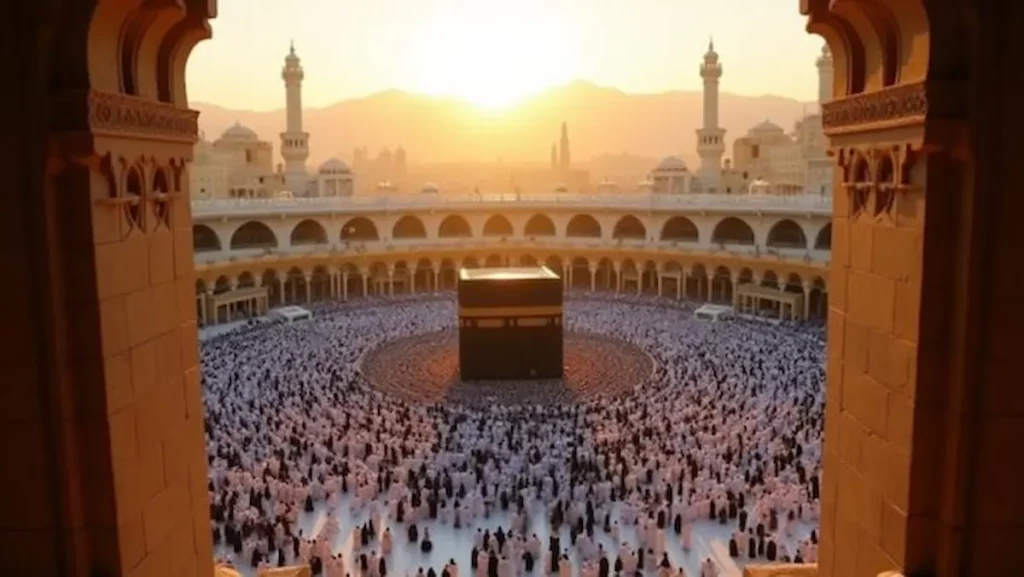The origin of Islam takes us back to the early 7th century, when the Arabian Peninsula stood as a meeting place of trade, culture, and faith. In that setting, the Prophet Muhammad received revelations believed to come from God through the Angel Gabriel words that would become the Quran, a guide for both spiritual devotion and daily living.
To reflect on the origin of Islam is to see a community searching for moral clarity, unity, and a deeper bond with the divine. Even in its earliest days, believers faced trials, yet the message of one God, compassion, and justice carried them forward.
When we pause to consider the origin of Islam, we are invited not only to learn its history but to recognize the lasting ways it continues to shape faith, values, and spiritual vision across the world.
Historical context of the Arabian Peninsula
The Arabian Peninsula in the early 7th century was a vibrant crossroads where religion, spirituality, and trade shaped daily life. Tribal societies governed local customs, while bustling trade routes connected communities and encouraged the exchange of ideas. In this setting, religion and spirituality were deeply woven into social structures, with pre-Islamic beliefs coexisting alongside emerging religious movements.
Geography played a key role in shaping economic activity and spiritual practices. Desert landscapes and caravan networks linked cities and tribes, allowing religion and spirituality to influence cultural interactions and political dynamics. Sacred sites, seasonal festivals, and local rituals reflected a diverse spiritual landscape that guided communal life and personal belief.
As regional alliances formed and conflicts arose, religious diversity remained central to identity and social order. The interplay of tribal loyalty, trade-driven exchange, and evolving belief systems created a complex environment where religion and spirituality shaped values, ethics, and community bonds, setting the stage for transformative spiritual change in the Arabian Peninsula.
Life of the Prophet Muhammad
Prophet Muhammad played a transformative role in the history of religion and spirituality in the Arabian Peninsula. Guided by deep spiritual insight and personal revelations, Prophet Muhammad faced social challenges and cultural shifts with courage and wisdom, shaping a path grounded in ethical teachings.
Through his prophetic leadership, family influences, and sincere devotion, Prophet Muhammad established a foundation that changed the region’s religious and societal landscape and continues to inspire seekers of faith today.
The first revelations and the Quran
The first revelations of the Quran began when the angel Gabriel appeared to Prophet Muhammad, delivering divine messages that would shape Islam. These early moments introduced the Quran’s structure of chapters and verses, offering spiritual guidance rooted in monotheism and moral conduct.
Through the first revelations, the Quran established the core principles of faith, worship, and ethical living, preserved first through oral recitation and later in written form.
For those exploring religion and spirituality, understanding the first revelations of the Quran helps illuminate how Islam’s teachings emerged, spread, and continue to inspire believers around the world.
The early followers of Prophet Muhammad played a key role in shaping the Ummah. Even though the first acceptance of Islam was limited, these devoted believers formed a strong foundation for the growing Muslim community.
Through shared faith, mutual support, and a clear sense of purpose, the early followers helped build a united Ummah that strengthened social ties and spiritual identity.
Their commitment made the Ummah a lasting force in Islamic history, guiding the growth of Islam and inspiring future generations within the Ummah.
Social and religious climate before Islam
Before the emergence of Islam, the social and religious climate before Islam in the Arabian Peninsula was shaped by a mix of beliefs, traditions, and power dynamics. The region featured polytheistic practices alongside pockets of Judaism and Christianity, creating a rich spiritual landscape.
Tribal customs guided daily life, but they also reinforced social inequalities, especially for marginalized groups. Trade routes brought wealth and cultural exchange, while pilgrimage to sacred sites like the Kaaba played a central role in community life.
Gender roles were defined within tribes, influencing family structure, leadership, and rituals. Understanding the social and religious climate before Islam helps us see how faith, spirituality, and society were already intertwined, setting the stage for the transformative message that Islam would soon bring.
Key teachings and principles of Islam
At the core of Islam are key teachings and principles that shape a believer’s life every day. The principles of Islam highlight monotheism (belief in one God), compassion, and justice, encouraging Muslims to live with integrity and purpose.
Ethical teachings in Islam promote social justice, charity, and community service, while spiritual practices like daily prayer and fasting deepen faith and self-discipline.
Religious rituals and theological concepts, such as the Five Pillars, further strengthen the principles of Islam, building a cohesive, morally grounded community rooted in mercy and responsibility.
The Hijra: migration to medina
The Hijra was a turning point in early Islamic history, marking the migration to Medina by Prophet Muhammad and his followers.
In Mecca, growing opposition from local leaders made it difficult for early Muslims to practice their faith openly.
With the Hijra, the community found a new beginning in Medina, where the city’s welcoming environment allowed Islam to grow and organize.
This migration to Medina strengthened the Muslim community, laid the foundation for Islamic leadership, and marked a pivotal chapter in the spiritual journey of Islam.
Early conflicts and consolidation of the Muslim community
During this formative era, the early conflicts and consolidation of the Muslim community in Medina shaped both faith and identity. Facing external threats and internal challenges, believers navigated skirmishes that tested their commitment and guided spiritual growth.
Through these trials, the early conflicts and consolidation of the Muslim community fostered unity, deepened social bonds, and strengthened political structures rooted in shared values.
This period was crucial for solidifying leadership and forming a cohesive identity grounded in religion and spirituality.
The early conflicts and consolidation of the Muslim community laid the foundation for Islam’s endurance and expansion, helping followers cultivate resilience, trust, and a clear sense of purpose.
Spread of Islam beyond Arabia
The spread of Islam beyond Arabia unfolded through a powerful mix of trade, diplomacy, and military expansion. Along major trade routes, merchants shared beliefs and practices, encouraging cultural exchange and helping the spread of Islam beyond Arabia through peaceful contact and mutual benefit.
Missionary efforts, interfaith dialogue, and strategic political alliances further supported social cohesion, making the faith accessible to diverse communities. At the same time, military campaigns, paired with policies of religious tolerance and respectful governance, allowed the spread of Islam beyond Arabia to adapt to local customs while maintaining spiritual principles.
This balance of faith, culture, and cooperation ensured the lasting spread of Islam beyond Arabia across many regions and societies.
Legacy and impact of Islam’s origins
Islam’s origins left a powerful legacy that transformed cultures, societies, and politics across regions.
The early spread of Islam encouraged cultural exchange, bringing together diverse traditions, sciences, and philosophies. Rooted in its spiritual principles, Islam also promoted forms of religious tolerance that supported coexistence among different faiths.
This legacy shaped legal systems, art, and education, creating a long-lasting global influence. For those exploring religion and spirituality, understanding Islam’s origins offers insight into how faith can guide social change, inspire learning, and build bridges across communities.
Conclusion
The origin of Islam traces back to the early 7th century in the Arabian Peninsula, centered on the life and teachings of the Prophet Muhammad. At the heart of the Islam origin is the Quran, believed by Muslims to be the final revelation, which guided a diverse society toward a shared spiritual path. From this foundation, a united Ummah community emerged, overcoming early challenges and setting the stage for rapid growth beyond Arabia. Understanding the Islam origin helps us see how its message shaped faith, culture, and history, influencing religious and spiritual life around the world.
Amanda Torati is a linguist and postgraduate researcher dedicated to the study of interfaith dialogue and cultural expression. With an academic background in languages, she specializes in analyzing spiritual texts and universal values to bridge the gap between ancient traditions and modern reflection. At ABPray, Amanda combines her passion for research with a mindful approach, ensuring that every article promotes harmony, respect, and deep spiritual insight for seekers of all backgrounds.
Buddhism
When Buddhism faces its greatest dilemma: religion or philosophy? And why the answer changes inside a meditation hall
The question seems simple until you ask it to a Thai monk, a secular mindfulness teacher in Brooklyn, and a Tibetan scholar all in the same afternoon. None of them will agree. And this disagreement isn’t a problem of language or mistranslation, it’s the living scar of 2,500 years of Buddhism trying to fit into […]
Christianity
The abyss between worlds: why Mormonism and Catholicism represent irreconcilable metaphysics, not mere doctrinal disagreement
Discover the intriguing contrasts between Mormonism and Catholicism, but what hidden truths about salvation and the afterlife will you uncover?
Christianity
The question that breaks itself: why “are Jehovah’s Witnesses Christian?”Reveals something fractured at Christianity’s core
For those curious about the faith of Jehovah's Witnesses, their unique beliefs challenge traditional Christian definitions—what does this mean for their identity?
Buddhism
Beyond the textbook trinity: what really separates Theravada, Mahayana, and Vajrayana
Get to know the three main types of Buddhism, Theravada, Mahayana, and Vajrayana, and discover which path might resonate with your spiritual journey.
Buddhism
Buddhist non-theism is a lie: what I discovered when I stopped accepting the textbook explanation of what Buddhism actually is
Discover insights that could transform your spiritual journey.
Buddhism
I sat with a Hindu Priest and a Buddhist Monk for six hours. Here’s what they revealed about why their traditions can’t agree on anything, including reality Itself
It was 9 AM on a Saturday morning in a rented conference room in Boston, and within ninety seconds, these two practitioners had outlined a chasm so fundamental that I realized this conversation would not be about finding common ground. It would be about understanding why common ground is impossible, and more importantly, why each tradition contains internal contradictions so severe that they can barely agree with themselves.






